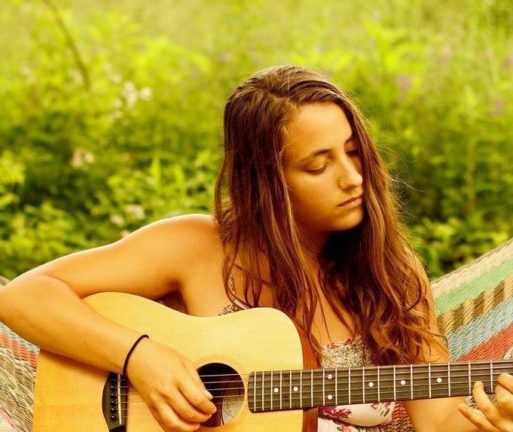
Morgan Bolender sits on the board of You’re Going To Die, a Bay Area, California-based nonprofit dedicated to bringing diverse communities into the conversation of death and dying. She is also the head of Songs For Life, a program run by You’re Going To Die that brings musicians and their music to hospice patients. Morgan is also a passionate singer-songwriter.
Editor’s note: This interview has been edited for length and readability.
Ellary Allis: What brought you to the first You’re Going To Die open mic?
Morgan Bolender: I was really new to the Bay Area after five years of traveling all around, and I hadn’t made any friends yet. It was one of the first events I went to after living in the area. The first thing I’d gone to was a musical hike, and the leader of it mentioned You’re Going To Die and it seemed like something I’d really enjoy. When I went to the first one, I was blown away with how perfect it felt for me. There was an environment of reverence but not at the expense of laughter and lightness. There was a lot of laughter and also a lot of crying. Also, the quality of the open mic was amazing to me –the depth of presence people brought, the energy of authenticity in the room, the way everyone was silent when people were performing even when it was packed. The room just buzzes with aliveness.
There’s a real need for spaces like the kind that You’re Going to Die provides. I’m not the only one that feels their heart exhale when they’re in the room.
Ellary: How has being part of You’re Going To Die impacted your own relationship to mortality?
Morgan: My own death is at the blind spot of my intellect. I cannot wrap my mind around it. But the closer I feel to it, the closer I feel to being alive and the closer I feel to understanding that I won’t always be here. And that impacts the way I treat people, the way I show up, and the way I treat my days. You’re Going To Die provides the benefits people get from going to a funeral, where the preciousness of life is palpable, but without the personalized trauma or personalized grief. It’s the benefit of being confronted with, “This is your life, it’s not going to last forever, so what are you going to do about it?” It’s good practice. And now it’s amplified, because now a couple of times a week, through the Songs For Life program, I’m bringing my music to hospice patients, sitting at the bedsides of people who are actively dying.
Ellary: A couple of times a week sounds like a lot to process. How do you take care of yourself and stay centered and grounded while holding space for sitting at the bedsides of dying people multiple times a week?
Morgan: It’s relatively new, and I’m learning to use the resources that are available to me. This actually came up at our last You’re Going To Die board meeting. After sharing a few of my experiences during the week, I thanked everyone for listening. I received the feedback that I don’t need to wait for meetings to talk about it. The board members asked what they could do to support me around this. Ned Buskirk, the founder of You’re Going To Die, said, “Not only do I want you to talk to me about how you’re feeling, but I’d like to be your first call.”
It’s new and I’m learning. When I’m feeling good and grounded, it feels nourishing to go and be with hospice patients. It’s not different from what I need to do to feel good on any given day. I have a meditation practice; I try to eat well, to sleep well, to talk to friends.
Ellary: Do you have any particularly poignant stories from Songs for Life visits with hospice patients that you’d like to share?
Morgan: My first patient was a woman who’s in the final stages of Alzheimer’s and is non-verbal. I went to her bed and she looked into my eyes in a way that I can only describe as infinitely loving and oceanic, with no shores. I felt so loved — arguably more loved than I’ve ever felt. And I just thought, “Wow. This is day one?!” I sat and played for her, and for a solid 80 percent of the time I was playing, she was staring into my eyes.
Just this past week, I went back after a few weeks away in Mexico for my sister’s wedding. When I saw her, she just lit up smiling with that same eye contact. At one point, while I was playing “Hallelujah,” I saw her tongue moving and she was mouthing the words. It was amazing, given where she’s at cognitively. I just wondered, “Who is this person and who has this person been that without words they are such an enormous, beautiful, loving presence?”
I finally got a chance to talk with her aid and find out why this woman has such an amazing presence. The abridged version is, when she was 16, her mom put her on a boat from France to New York, with no money. She got to New York, stayed with some family for about a week, and then they put her on a train to California. She didn’t speak English, and all they’d sent her off with was a backpack filled mostly with candy.
She got to California and stayed with her sister and brother-in-law for a few weeks until the brother-in-law kicked her out. Ultimately, this woman became a lawyer. She’s now between 75 and 85 and back when she went to law school she was in a class with 450 classmates and she was one of three women. They were treated horribly; they weren’t even allowed in the cafeteria. She then went on to work with National Geographic and Doctors Without Borders. She would go to conflict zones and offer legal aid. She went to Afghanistan; she went to Syria and showed up ready to help in whatever way she could. I also learned that music was a huge part of her life, so to get to show up there with music is just the honor of a lifetime.
Ellary: Through Songs For Life, you write music for hospice patients, right?
Morgan: Yes. It’s new, but we have a bunch of songs in process. And my partner and I have a band together called The Feelings Parade. We’ve been hired to write songs for people as gifts to other people. So I’ve had some experience writing songs like this. I met my partner, Scott, at You’re Going To Die. He is on the board as well, and he is producing the You’re Going To Die podcast, which hasn’t been launched yet but is something to look forward to!
Ellary: Thanks so much for taking the time to share your work with SevenPonds, Morgan!
Morgan: Thank you! It’s been lovely speaking with you.
If you missed part one of our interview with Morgan Bolender, please catch up here.

 How Can Music Soothe and Comfort Hospice Patients?
How Can Music Soothe and Comfort Hospice Patients?


 Final Messages of the Dying
Final Messages of the Dying
 Will I Die in Pain?
Will I Die in Pain?















